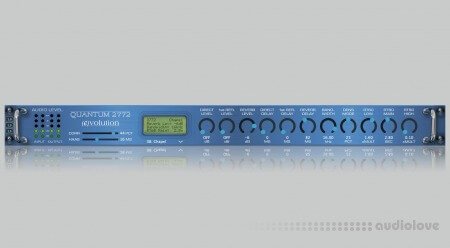Windows
Savant Audio Labs Quantum 2772 Evolution v2.0.3 [WiN]

MOCHA | 08 June 2023 | 9 MB
The Quantum 2772 Evolution is a true algorithmic stereo reverb, inspired by the legendary German room simulator algorithm and offered here for the first time in plugin format.
The Quantum 2772 Evolution reverb algorithm is fundamentally different from other reverb simulators, offering unsurpassed realism and depth.
There are three principles that make the Quantum 2772 Evolution uniquely different than the vast majority of other reverb processors:
1) Accurately modeled resonances of a space. Reverb simulators commonly use “ray tracing” within the time domain to attempt to provide the aural cues necessary for size, depth, and other factors. The Quantum 2772 Evolution takes a different approach by modeling the resonant modes and modal densities of a real room. By modeling the modal density patterns and distribution of resonances throughout a room, the listener is provided with psychoacoustical cues that help to create a true sense of space and depth.
2) Unique, non-linear dynamic envelope. Most reverbs respond in a linearly static way to sound impulse stimuli, resulting in a rather predictable and two-dimensional sound. Because of its system of related, interconnected resonators, the Quantum 2772 Evolution is able to create a much more realistic envelope of sound in the attack phase by creating a non-linear system which models the complex resistance and inertia characteristics of a real room. As a result, a certain clarity of sound is achieved as shorter, softer sounds are left unclouded, while longer sounds gradually build into realistic, complex tails.
3) Clear, un-modulated reverb. Most reverb simulators rely on modulation to avoid a buildup of harsh resonances within the soundfield which often results in unnatural time and pitch fluctuations. Because the Quantum 2772 Evolution embraces the natural interaction and build-up of well-coordinated resonances, it does not need to rely on any form of modulation, offering a degree of clarity, naturalness and pitch-stability not typically found in other reverbs.
home page
The Quantum 2772 Evolution reverb algorithm is fundamentally different from other reverb simulators, offering unsurpassed realism and depth.
There are three principles that make the Quantum 2772 Evolution uniquely different than the vast majority of other reverb processors:
1) Accurately modeled resonances of a space. Reverb simulators commonly use “ray tracing” within the time domain to attempt to provide the aural cues necessary for size, depth, and other factors. The Quantum 2772 Evolution takes a different approach by modeling the resonant modes and modal densities of a real room. By modeling the modal density patterns and distribution of resonances throughout a room, the listener is provided with psychoacoustical cues that help to create a true sense of space and depth.
2) Unique, non-linear dynamic envelope. Most reverbs respond in a linearly static way to sound impulse stimuli, resulting in a rather predictable and two-dimensional sound. Because of its system of related, interconnected resonators, the Quantum 2772 Evolution is able to create a much more realistic envelope of sound in the attack phase by creating a non-linear system which models the complex resistance and inertia characteristics of a real room. As a result, a certain clarity of sound is achieved as shorter, softer sounds are left unclouded, while longer sounds gradually build into realistic, complex tails.
3) Clear, un-modulated reverb. Most reverb simulators rely on modulation to avoid a buildup of harsh resonances within the soundfield which often results in unnatural time and pitch fluctuations. Because the Quantum 2772 Evolution embraces the natural interaction and build-up of well-coordinated resonances, it does not need to rely on any form of modulation, offering a degree of clarity, naturalness and pitch-stability not typically found in other reverbs.
home page
Only registered users can see Download Links. Please or login.


No comments yet